Living with Independence and Purpose
ETHOS Issue 20, Jan 2019
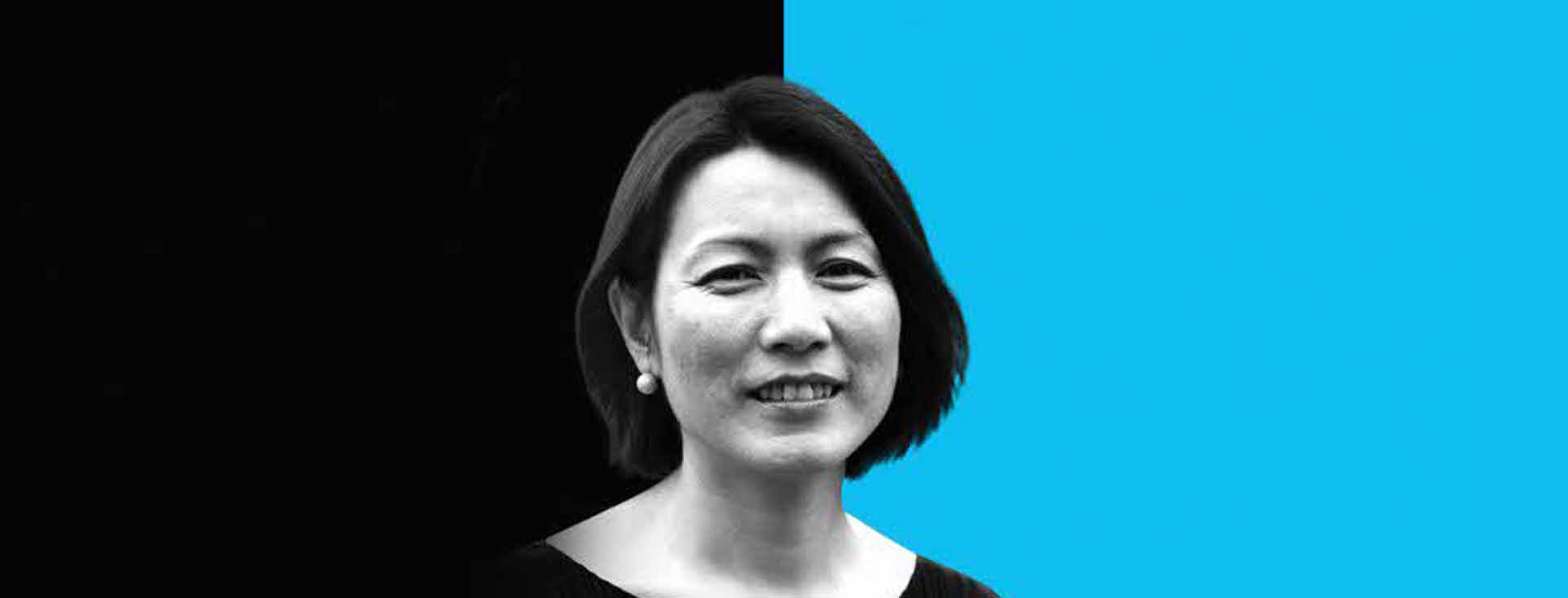
1. Is there anything distinctive about ageing as a phenomenon in Asian cities, both in terms of how it takes place and how it is perceived?
We know that Asia is ageing more rapidly than the rest of the world: this is one of the most significant differences. We know that as education and the economy improve, people live longer but also tend to have fewer children.
In terms of perception, the family culture and relationships are very different. Friendship in the US context, for example, is different from what we call friends in Asia, where family ties, including the extended family, tend to be much stronger. Asia is really family-based, even in terms of community support.
At the same time, there tends to be a social obligation, especially on women, to look after the parents. I am not sure if it is a matter of Asians respecting their elders more, or if it is a matter of social norms. The tendency is that more women are involved in caregiving than men.
In general, Asian elders are healthier relative to the rest of their age group, but they have different expectations for themselves. In the US, older people tend to take charge of their own old age—they do not depend on children. In Asia, there might be expectations, because of strong family ties, that the family will take care of them at the end of the day. There is also the social expectation that older persons should not have to do too much, that they ought to be looked after. This contributes to a sense of dependency. But physically, Asians are actually healthier.
2. How does the social obligation to look after the elderly, along with the sense of dependency it engenders, influence the way we approach issues of ageing?
I think there is a sense of ageism. Older people may feel that they have become “too old” to do something and resign themselves to being dependents. This is a systemic challenge: society has conditioned the elderly for a long time to feel this way, and it will be really hard to shift it.
In Japan, there is a divide between young people and older people. Younger people I talk to feel that seniors get pensions and social security, at the expense of the future of those who are young. This creates some resentment towards older people, which I feel is unnecessary.
If you think about it, age 65, which in Japan triggers pensions and other social provisions, is an arbitrary number. It was set at a time when being able to survive until 65 years of age was an accomplishment. These days, it is much more common. Older people are not that frail. Plenty of people who are over 65 are much healthier, and much more experienced. What it means to be 65 years old now is very different from what it meant thirty years ago.
So the way we perceive ageing and the social role of elders has to change. But it cannot be only done by one segment of society. We can’t expect older people to change overnight, and besides, everybody has got to change: young and old, policy and the public. The expectations have to change, and the social norms should follow through.
What it means to be 65 years old now is very different from what it meant thirty years ago.
3. What are some ways to start shifting these social norms regarding ageing?
That’s a complex question. Look at how the media portrays older people as dependents, and how nursing homes are viewed in a negative way. Everything has to change, and not only in terms of policy or the media.
The best place will be to start from the level of the community and the neighbourhood. Everything could begin from small changes and small actions. People want to volunteer; people want to reach out and I think older people want to change, but the challenge is that they don’t know what to do.
A good way to begin is to make sure that at the level of a small community, people can get to know each other. This is what I am doing in helping to create a dementia-inclusive community: something visible that people can see, with something they can be a part of and do something for.
Young people should be a part of this. And it need not stop with playing cards with grandma or grandpa: it can be more than that. There are plenty of things everyone can do. What needs to happen is that we should really stop thinking about “entertaining” older people. I want to see older people being change agents of society. They too have to take responsibility for their lives and to help create a better future. Ageing is a global issue. We don’t have enough people or resources to just look after older people, and besides, it is one-sided to only provide care. Seniors also have to be part of the change and part of the solution.
I hear a lot about the narrative of harnessing the wisdom and experience of the elderly, but my question is how we are going to do it. I think a lot of older people don’t know how to contribute. And we don’t know how to have them contribute, so that is the discussion and the conversation that needs to happen.
4. How can we move from a top-down, medicalised view of ageing towards a more broad-based approach that empowers seniors?
The narrative is important but now I think what we have to do is to see how we can actually do that. We need a concrete project for people to see. That’s very important. This is the value of Ibasho’s physical facilities.1 As a senior, you can go and find something in Ibasho that you want to do. But if you are in a community with only senior care centres and nursing homes, you feel like you don’t belong; that you don’t have a platform as a senior.
The public and private sectors could think about how to create more platforms for older people to be able to use their knowledge and wisdom. I think it’s too much for us to ask seniors: “You have experience so why don’t you create your own opportunities and find out what you can do today for other people?” We have to figure out what platforms seniors need so that they can make use of their talents and skills to help others and make a difference. I want to be able to see more places where people can go to help someone, perhaps once a week or once a day.
Older people tend to be socially isolated, but merely bringing them to a conversation table, is not going to create meaningful relationships with others. People need a purpose. Everybody wants to be useful. And everybody has something to contribute. Retired CEOs will have more things to do, so I won’t worry about them too much. Other people might be good at doing the dishes, or cleaning, or teaching English, or fishing.
You don’t want to do exercise for the sake of exercise; you don’t want to volunteer for the sake of volunteering; you want to do something for others and see people being happy because of your service.
What we need is something that gives meaning to the elderly. I feel like that is what is missing in the eldercare system.
We should really stop thinking about “entertaining” older people. I want to see older people being change agents of society.
Empowering Elders Through Community Ownership
In 2011, over 18,000 people were killed and more than 65,000 people were displaced when a massive earthquake and tsunami hit northern Japan. When Ibasho and Operation USA visited the affected area to conduct interviews with elderly survivors in temporary community housing, they heard tales of extraordinary courage and hardship, and also of a strong desire to contribute to the rebuilding of their communities. The Honeywell Ibasho House was inspired and created by this spirit, as a partnership between the community of Ofunato in Japan, Ibasho, Operation USA and Honeywell.
Here, older people do not passively sit and be served. Instead, they actively join in the planning, management and operation of the organisation. It is a place where elders participate in significant discussions and working is a normal part of everyday life.
People need a purpose. You don’t want to do exercise for the sake of exercise, you don’t want to volunteer for the sake of volunteering; you want to do something for others and see people being happy because of your service.
—Emi Kiyota
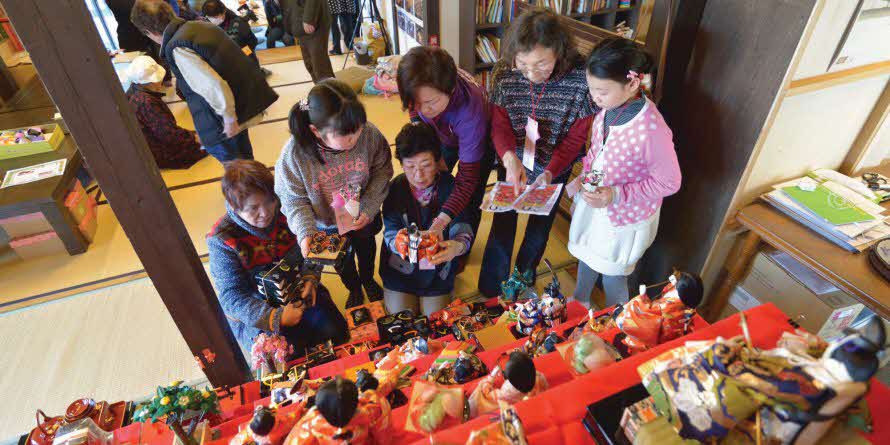
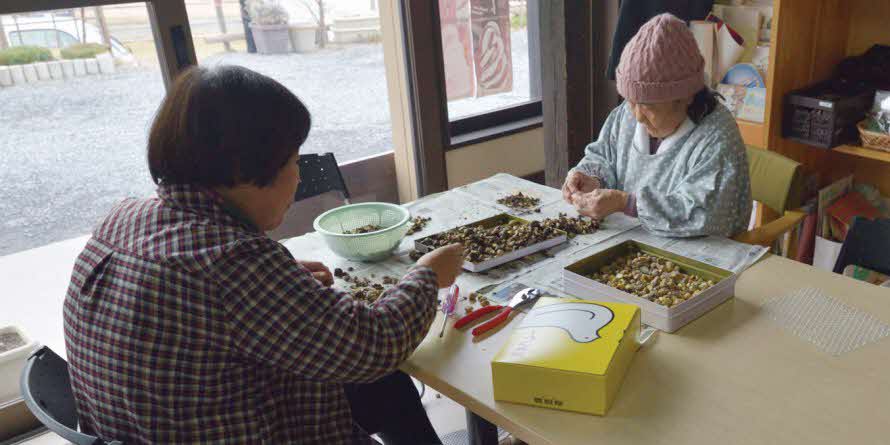
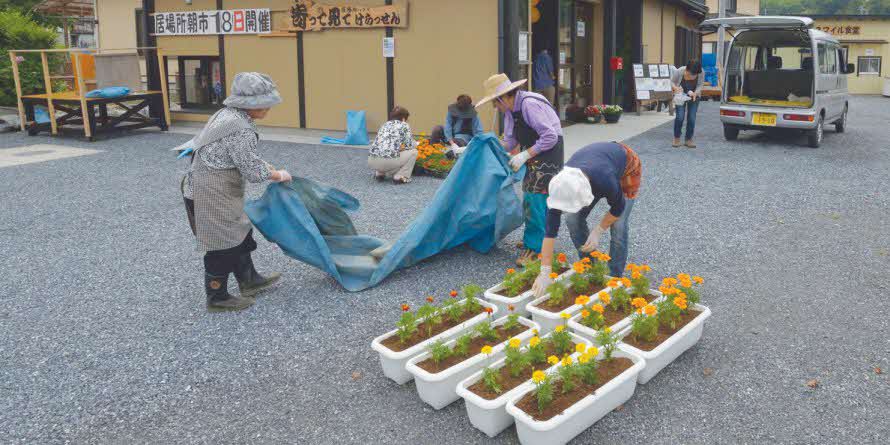
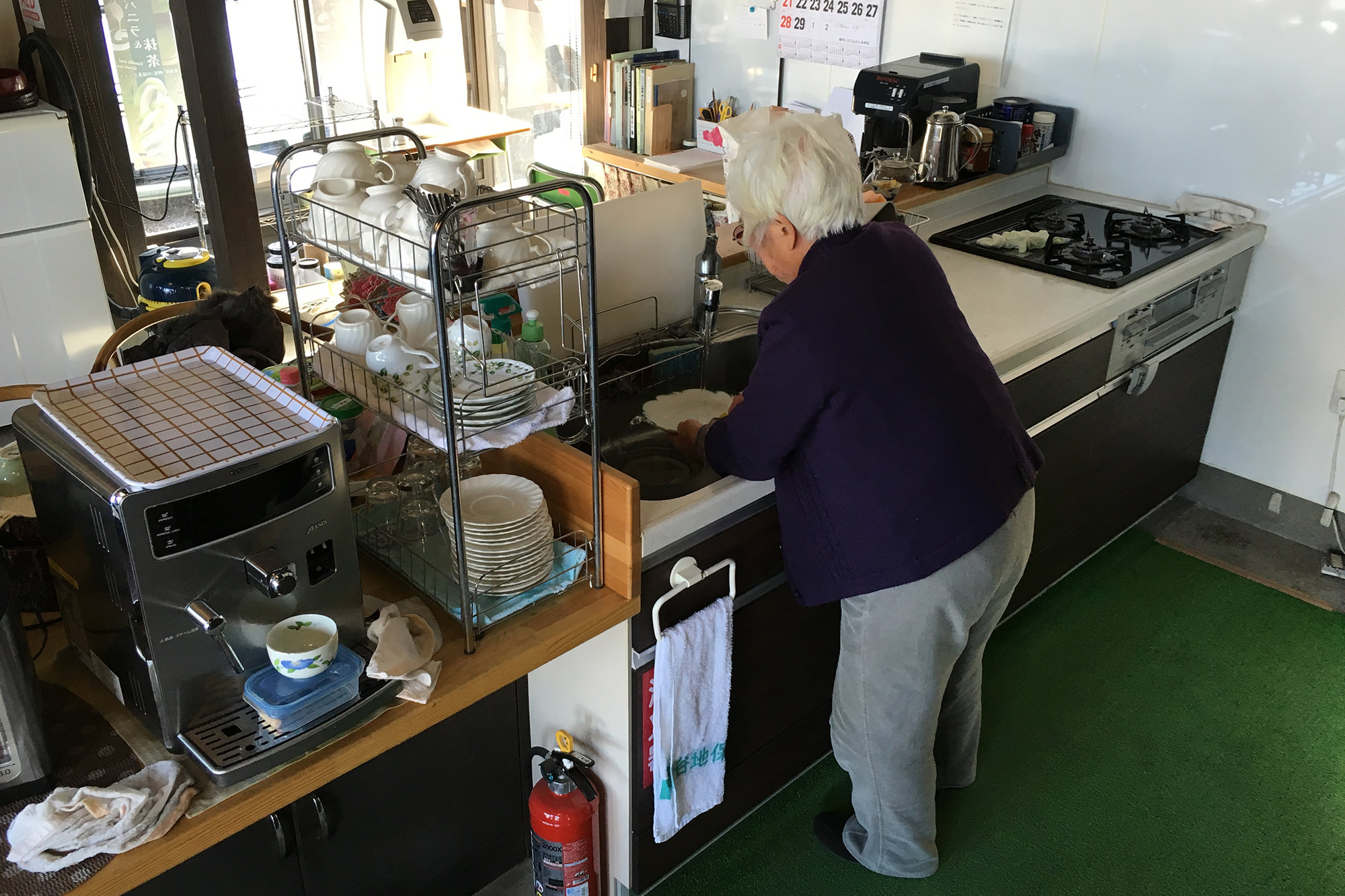
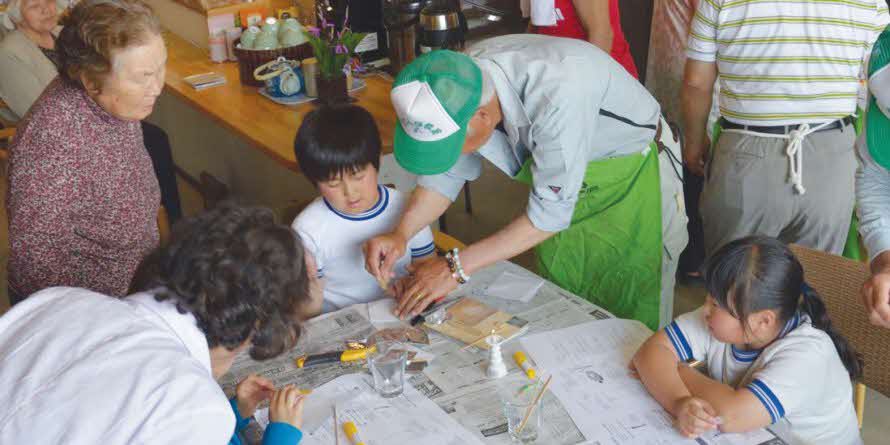
Source: Photos courtesy of Ibasho and Dr Emi Kiyota. For more information on Ibasho, visit www.ibasho.org.
5. What else can the public and private sectors do to empower seniors, and support others in doing so?
What I’m trying to do with Ibasho is not to replace nursing homes or other institutions. Instead, it is to add one more option—to empower older people to be able to do the things that they want to do, because that’s missing.
In Japan, Ibasho is completely community-owned and a grassroots effort. Beyond a certain point, you can’t work with the government or corporate sector without compromising the grassroots experience. It’s a fine balance.
That said, the land is given to us by the local government to use for 10 years, and I don’t think we could do it without rent-free use of the land. We will have to figure out after the 10 years are up, how we are going to proceed. Honeywell Corporation donated the upfront cost of construction for the building, as part of their corporate social responsibility. That’s how the community was able to get going.
So I have a feeling that the government has to be part of the solution, and private companies want to be part of the solution. The question is how to work with the different stakeholders while still empowering older people to be change agents. I would love to sit down with policymakers and non-governmental organisations and figure out what might be the best way forward. And what works in Japan is not necessarily going to work in Singapore. The culture is different, as are the governmental functions and structures.
But if the government were to try to figure out what seniors and their families want, that again becomes top down. So it will be interesting to see a few stakeholders from various areas really sit down, determine what scenario they want to bring about, and how best to work together.
While we cater to specific populations, we have to be very careful not to segregate people as this can create more ageism and more stigma.
6. There are cultural, social, gender and other differences in engaging seniors to be more active. What other aspects of ageing should we be paying more attention to, as we think about how best to support seniors?
We can’t really cater everything for everybody but to me, social determinants, such as education, health and so on do matter. I have a feeling that in Singapore there is less of a significant gap between the wealthy and non-wealthy in this context.
One big thing that tends to be missing from the picture is the dementia issue. It is something people don’t want to talk about. When dementia surfaces, people always think we need an institution, or a dementia-specific environment. But dementia simply means a person has a memory problem and it’s just like a physical disability or sensory impairment: they should be able to live in the community, but how we are going to actually integrate them into our living environment is something we should really think about.
Also, we tend to talk about everybody over 65 in the same bundle, but there is a 40-year difference between seniors who are 65 and those who are 105. We need to pay attention to these differences. At the same time, while we cater to specific populations, we have to be very careful about segregating people—for instance by designing facilities or services specifically for older people—as this can create more ageism and more stigma. Instead, what we want is for everyone to enjoy accessibility and an independent life.
People do also become frail. We tend to avoid talking about frailty, but I think we shouldn’t. Active ageing is a much more fun topic, so people like to discuss it a lot, but we have to have both conversations going to make things better. Otherwise, people are always going to be worried about old age because they are worried about being fail and what might happen. We don’t want a polarised, backwards narrative where if you happen to have dementia or be frail, then you’re not ageing successfully and you’re marginalised.
7. Could technology help us to better engage with ageing-related issues?
I think the convenience and extensive usage of technology might create social isolation, because we don’t have to interact with other people. But we should be using technology as a tool to help seniors be more independent and also to have better relationships with others. The technology by itself should be neutral, and the use of technology should not in itself be a goal: it is a tool, for people to be able to connect with each other, and to help get things done.
It’s the same with architecture: it is not just about attractive design. We want to make people’s lives better. If technology were too advanced, it can be intimidating and not helpful. Instead, a simple technology such as a telephone can help connect people. And just providing gadgets for people to kill time is not useful, because it doesn’t give meaning and purpose.
I want people to treat me thirty years down the road the way they treat me now: as a normal human being.
8. How do you hope to spend your own senior years when the time comes?
I want people to treat me thirty years down the road the way they treat me now: as a normal human being. I don’t want them to give me special treatment.
If I can’t hear, I will just say, “Sorry my hearing is not good, can you repeat that?”. I don’t want to be treated like a child just because I might be older and might not be able to see or hear as well. I think I would have enough wisdom to be able to handle the loss of any physical or sensory abilities. I personally would like to be able to have enough wisdom to accept this, and not become a bitter person if I’m not able to walk or even to chat.
I want to make my own decisions about how to live my day, which is like how I live my life like now. I’m such an introvert, that if I have to go a nursing home, I might not be interested in their activities: I’d rather just read my book. And I’d want those wishes to be respected.
NOTE
- Founded by Dr Emi Kiyota, Ibasho is a non-profit platform to promote the intergration of elders within communities. In Japanese, the name Ibasho means “a place where you can feel like yourself”. See: http://www.ibasho.org

